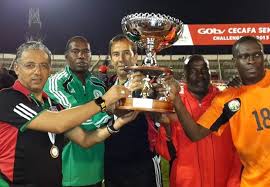By Mark Baber
November 23 – The Council of East and Central Africa Football Associations [CECAFA] has elected President of Sudan Football Association, Dr. Mutasim Gafaar as head of the body, on the eve of the start of the 2015 CECAFA Challenge Cup.
Gafaar won 6 votes out of 10 in the election with his closest contender being Lawrence Mulindwa from Uganda.
The General Assembly was attended by FIFA presidential candidates Jerome Champagne and Prince Ali bin al-Hussein who were both given the chance to speak. Champagne promised two more seats on FIFA’s executive committee and one more World Cup slot to Africa, but was reportedly trumped by Prince Ali who offered three World Cup slots.
The result of the election was greeted by the outgoing president, Ledodegar Tenga of Tanzania who said, “Mutasim is a visionary man who is capable of leading the region to a greater development.”
“I am very proud that I had given my best in the last eight years I served as CECAFA president.”
Gafaar himself promised that under his leadership the CECAFA region would make more progress than ever before.
Four executive committee members were elected: Abdiqani Said Arab [Somalia], Alei Ghabur Goc [South Sudan], Souleiman Hassan Waberi [Djibouti] and Habimona Aimable [Burundi) whilst Nicholas Musonye [Kenya] will continue Secretary General.
Meanwhile, CECAFA’s principal annual nation’s competition, the CECAFA Senior Challenge Cup, kicked off at the weekend. Africa’s oldest nations’ tournament, founded in 1926, is this year contested by Burundi, Djibouti, Ethiopia, Kenya, Malawi, Rwanda, Somalia, South Sudan, Sudan, Tanzania, Uganda and Zanzibar.
The weekend’s matches saw Ethiopia, the hosts lose 0–1 to Rwanda, Tanzania beat Somalia 4-0, Kenya beat Uganda 2-0 and Zanzibar lose 1-0 to Burundi.
Zanzibar, which has a long independent football tradition of its own (with the Football Association founded in 1926) is currently an associate member of CAF, having had its application to be granted full membership of FIFA controversially rejected by FIFA’s Executive Committee – reportedly on the rather inadequate grounds that the semi-autonomous Indian Ocean island state is “not an independent state recognised by the international community at present, nor is it likely to be in the foreseeable future.”
Contact the writer of this story at moc.l1745116891labto1745116891ofdlr1745116891owedi1745116891sni@r1745116891ebab.1745116891kram1745116891

